- PURPOSE
Hampshire Christian Trust CIO (HCT or 'The Trust') is fully committed to safeguarding and protecting the welfare of all children, young people and adults at risk by taking all reasonable steps to protect them from threats, risks and vulnerabilities. All Trustees, employees and volunteers will at all times show respect and understanding for the rights, safety and welfare of all children, young people and adults at risk with whom the Trust comes into contact, and conduct themselves in a way that reflects our principles. We take safeguarding seriously because we believe God gave every human his image and therefore they have his dignity. It is part of our beliefs that we protect the vulnerable, facilitate rehabilitation for the broken and defend all from dangers we know to exist.
The Trust exists to provide a resource for groups, mainly connected to churches, but not exclusively, to have time away from their usual environment. The main provision is a camp site with its attendant cabins, sanitary facilities, leisure space and kitchen.
All our user groups should be familiar with our policies and procedures, and are expected to comply with them. They confirm they have a Safeguarding Policy of their own, and acknowledge the legal duty to report any safeguarding, child and adult protection concerns or welfare concerns to the Designated Safeguarding Lead (DSL) for the Trustees in a timely fashion if the incident relates to the Camp Site, HCT Staff, HCT Volunteers, HCT Trustees or comes under the Charity Commission’s reporting duties.
Hampshire Christian Trust acknowledges that safeguarding is the duty of everyone.
- POLICY OBJECTIVES
In support of this policy we will:
• Ensure that all HCT staff members are recruited according to current DBS recruitment guidelines and receive training and supervision appropriate to their roles.
• Have DBS (Disclosure & Barring Service) checks in place for any Trustees or volunteers regularly working on the site when a group may be in residence.
• Communicate to group leaders, HCT volunteers and others in positions of responsibility what our expectations are, of their behaviour and what they can expect in return.
• Display information to allow people to raise concerns or complaints about safeguarding concerns.
• Maintain an up to date contact list with statutory child and adult protection agencies to allow close liaison and joint working to the best possible standards, as necessary.
• Ensure arrangements are in place to maintain the health and wellbeing of all. Assess risks that individuals may encounter and manage these accordingly.
• Take a proactive approach to safeguarding which regularly reviews our practice and responds to issues promptly and competently.
2.1 Our policy applies to everyone who visits the HCT camp site and ensures that all children, young people, and adults at risk have the same protection regardless of age, disability, gender, racial heritage, religious belief, sexual orientation, or identity.
2.2 This policy is subject to review on an annual basis, or sooner if changes to the Trust’s circumstances or the legislative environment necessitate an earlier revision.
2.3 This policy has been written to ensure our safeguarding arrangements comply with statutory requirements, regional guidance and procedures together with current good practice.
- ACCOUNTABILITY
Hampshire Christian Trust seeks to be transparent in the way we seek to ensure that our safeguarding policy is fully implemented.
Our DSL is: Deborah Halifax, safeguarding@hampshirechristiantrust.org.uk
Our Chair of Trustees is: Martin Fielder, chair@hampshirechristiantrust.org.uk
• They will ensure any staff employed receive training in safeguarding, appropriate to their role.
• Ensure DBS recruiting and reporting procedures are adhered to.
• Ensure accurate records are kept of all reported concerns.
• Receive information from staff, group leaders or volunteers who have safeguarding concerns and record it.
• Assess the information promptly and carefully, clarifying or obtaining more information about the matter as appropriate. Ensuring reports are made to the relevant agency in all cases where children or vulnerable adults are thought to be at risk.
Hampshire Christian Trust recognises that it is not their role to investigate or decide if a breach has occurred, but to refer and take advice as appropriate. To this end, they are members of Thirty One Eight.
SAFEGUARDING OPERATIONAL PROCEDURES
4.1 Safer Recruiting
We have a clear recruitment and induction strategy for both volunteers and staff. With volunteers for work days, the persons are responding to the request from churches already known to the Trust for volunteers on a given day. This means they are adults in a group who have been recommended by their church fellowship and are known to them. These work days take place ‘out of season’ and under supervision. (Appendix 1)
In regards to the Site Manager role, HCT adhere to safer recruitment best practice, clear job descriptions, terms and conditions of employment, responsibilities and training programmes as necessary which identify relevant procedures. Each new Site Manager will be DBS checked and complete safeguarding training during their induction. This includes e-Safety, code of conduct, reporting systems and the role of the DSL.
4.2 Safer Environment
4.3 The site at Lockerley Water Farm is the subject of audits, inspections and procedures to mitigate risk and enhance the experience of user groups. These are reviewed by our trustee responsible for site operations (operations@hampshirechrisitantrust.org.uk).
4.4 The Trustees are regularly at work during the off season making sure that risks are minimised through tree management, checks on buildings, maintenance of the road/pathways, and grass cutting, and careful storage of machinery and chemicals. This is not an exhaustive list and does not automatically mean there are no risks at all. The Trust, therefore, makes sure that people have access to information on, for example, ticks, falling branches.
4.5 When groups are on site, this means that the Site Manager has the right and responsibility to close off areas if deemed a high risk of injury/accident, or to raise temporary signage as necessary. It is the responsibility of a user group leader to make sure any risks with the site that they become aware of are reported to the Site Manager as soon as possible. The Site Manager will perform routine checks to manage the health and safety of the site in season.
4.6 The risk assessment and management for a user group on the site remains at all times that of their group leader. They have specific responsibility for ensuring that small children, unaccompanied children and adults at risk are properly supervised.
4.7 Whilst groups should make their own first aid arrangements, they should record any accident in the Accident Book for review by the Trustees.
4.8 During the off season, the site has ongoing works. These work parties are mainly in groups, but occasionally a Trustee is working alone, they will:
• Inform others that they are at the site alone.
• Not work at height.
• Have the main barn door open for more speedy access to the landline.4.9 When a volunteer or Trustee brings a child or adult at risk with them on a workday, the child or adult at risk remains the responsibility of the volunteer or Trustee and must be appropriately supervised. The volunteer or Trustee should seek permission to bring the child or adult at risk with them, rather than assume they can be accommodated on a workday. The Trustee in charge of the workday must be aware of the risk any individual poses before they agree to allow them to attend.
4.10 All volunteers and Trustees will sign in and out during any workday.
4.11 No-one will operate machinery or use chemicals without having received training and supervision with that machine/chemical.
4.12 All accidents on site on workdays should be reported in the Accident Book, which is reviewed at each Trustee Meeting.
4.13 Please refer also to policy on Health and Safety, Chemical Storage procedures (available on request) and the information sent to user group leaders.
SAFER COMMUNICATION/DATA
5.1 A display board in the main barn will contain up to date contact details for our Trustees and the DSL.
5.2 We have a clear policy regarding confidentiality and information sharing linked to GDPR and the Data Protection Act 2018. Please see our Data Protection Policy.
5.3 We will ensure that accurate records are made, stored securely and only shared appropriately.
5.4 We fully endorse the principle that the welfare of children, vulnerable adults and young people override any obligations of confidence we may hold to others. Individual cases will only be shared or discussed on a “need to know” basis. In very exceptional circumstances when someone is concerned that the Trust is not dealing with child or adult safeguarding concern appropriately, they should contact HCT's Chair of the Trustee Board (chair@hampshirechristiantrust.org.uk). As a last resort they may contact Local Authority Children Social Care or Adult Social Care, or the police if a crime has, or may have been committed. This is an action that is legally covered by whistle-blowing (see also Appendix 1).
SAFER GROUP PRACTICE
6.1 HCT asks all appropriate user groups to confirm they have a DSL, First Aider and that they have risk assessed their group and activities. These risk assessments take variety of forms. The Trust is not standardising the form they must take.
6.2 The Site Manager will run through the fire procedure with the user group leader at the start of each residential or day visit.
6.3 Groups are expected to know who they have on site. Names other than the group leader do not need to be given to the Site Manager, but the group can be required to give the names several persons at any time. They should therefore have a sign in/sign out procedure for any visitors, so the exact number is known. It is good practice for a group that contains children not with their parents to have ‘visitor badges’, clearly identifying them. Groups should have DBS checks for those working with children as government guidelines already state.
6.4 Our site is insured for public liability. Groups should arrange their own insurance if they feel they may require it.
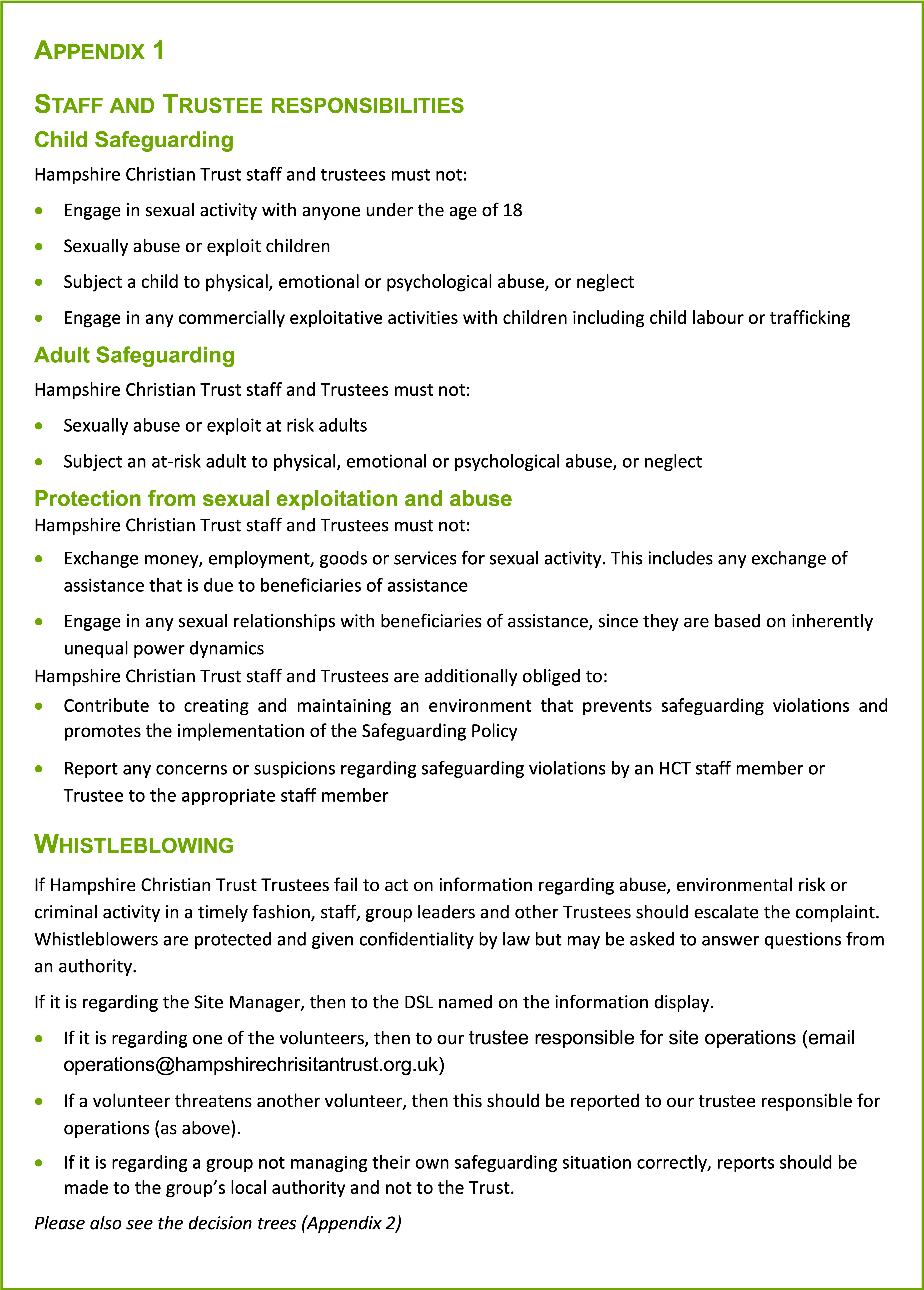
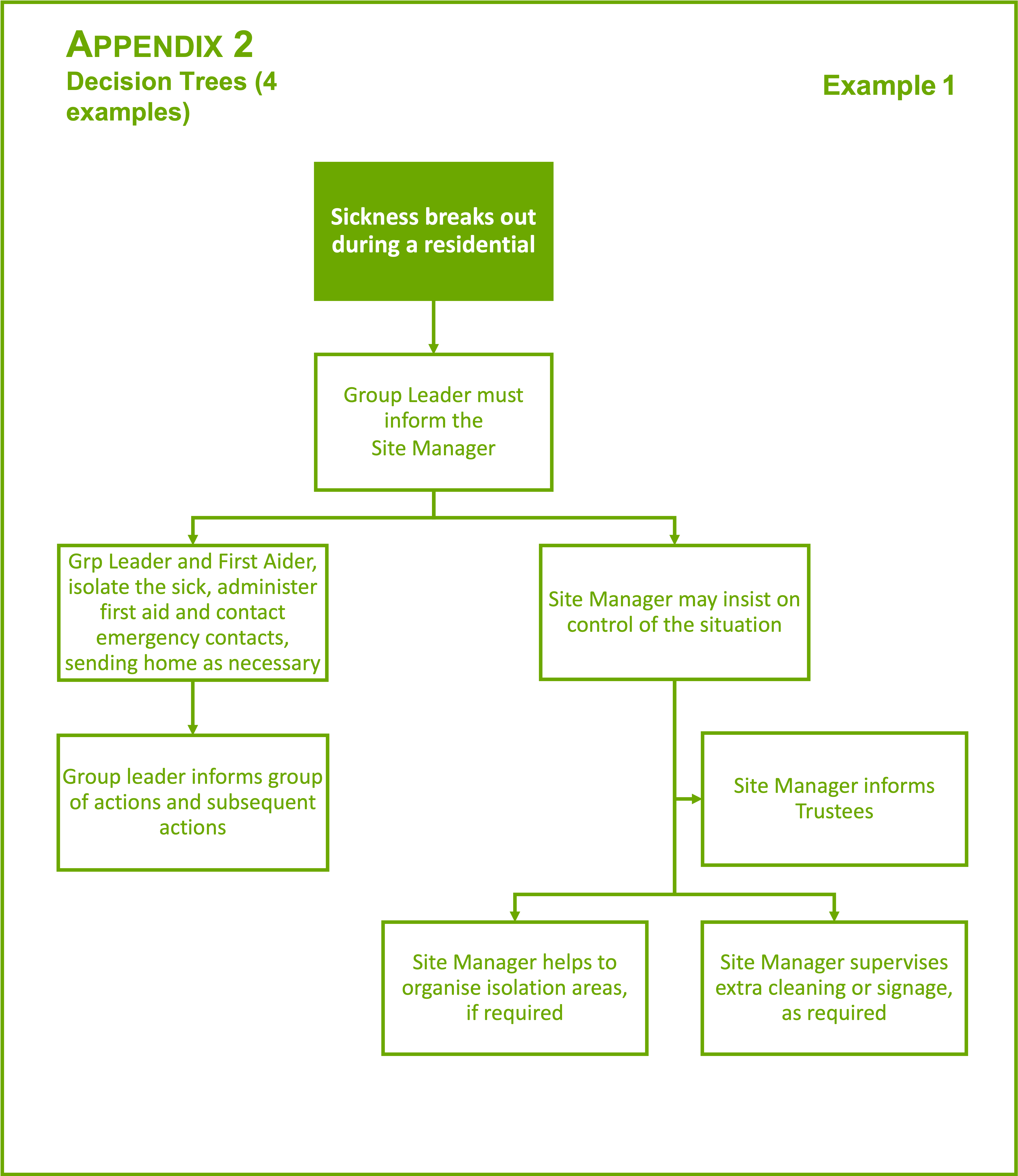
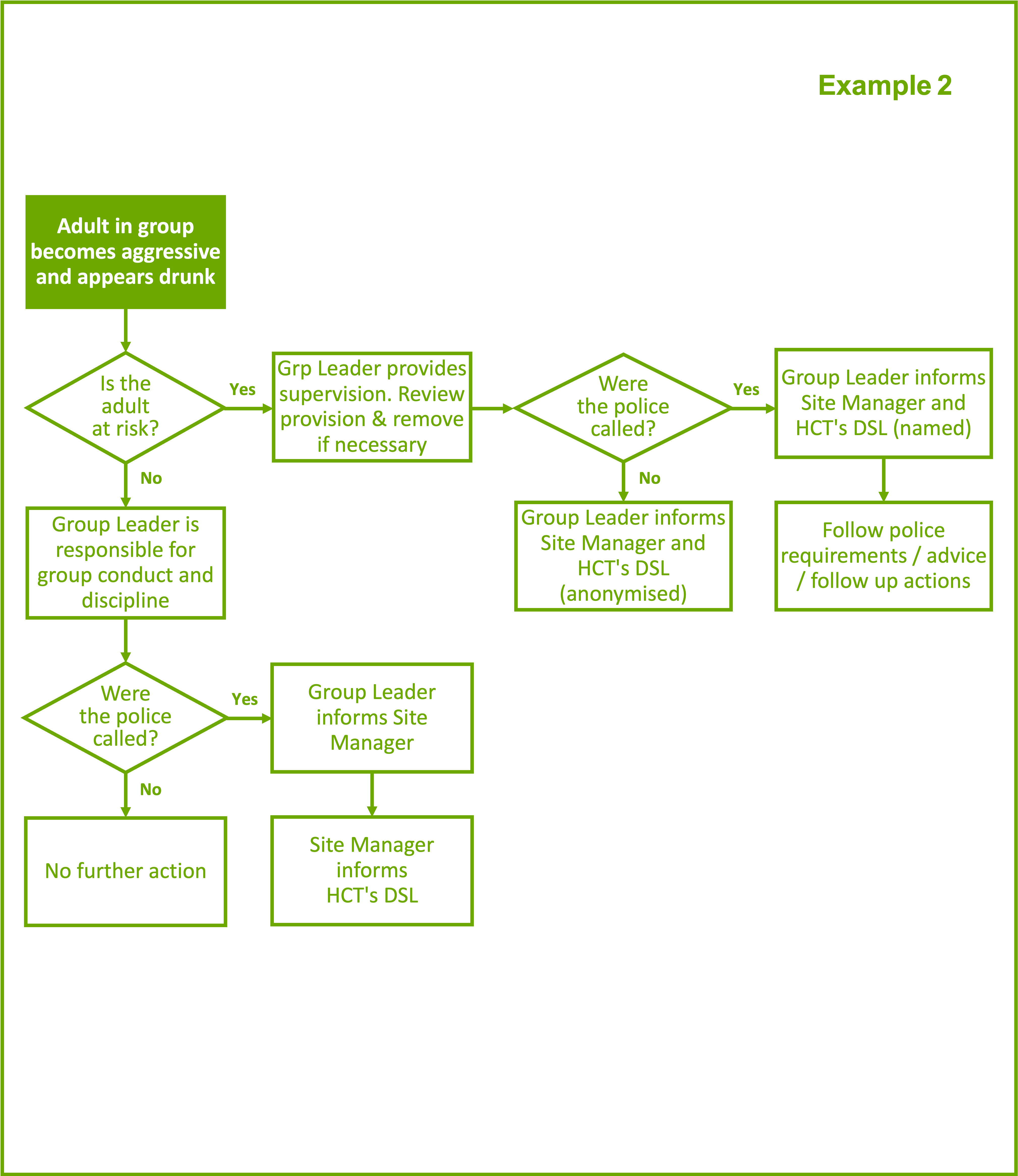
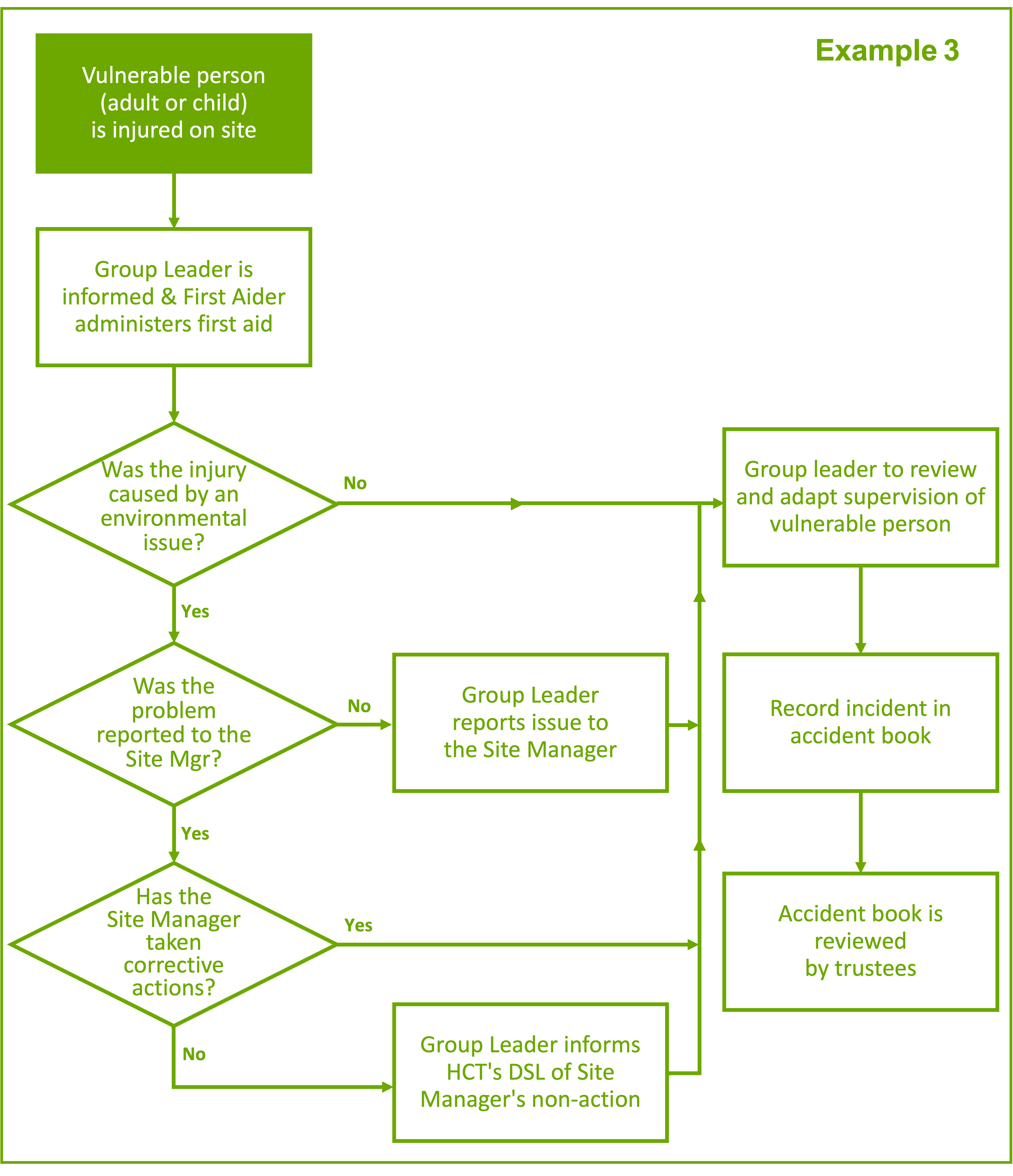
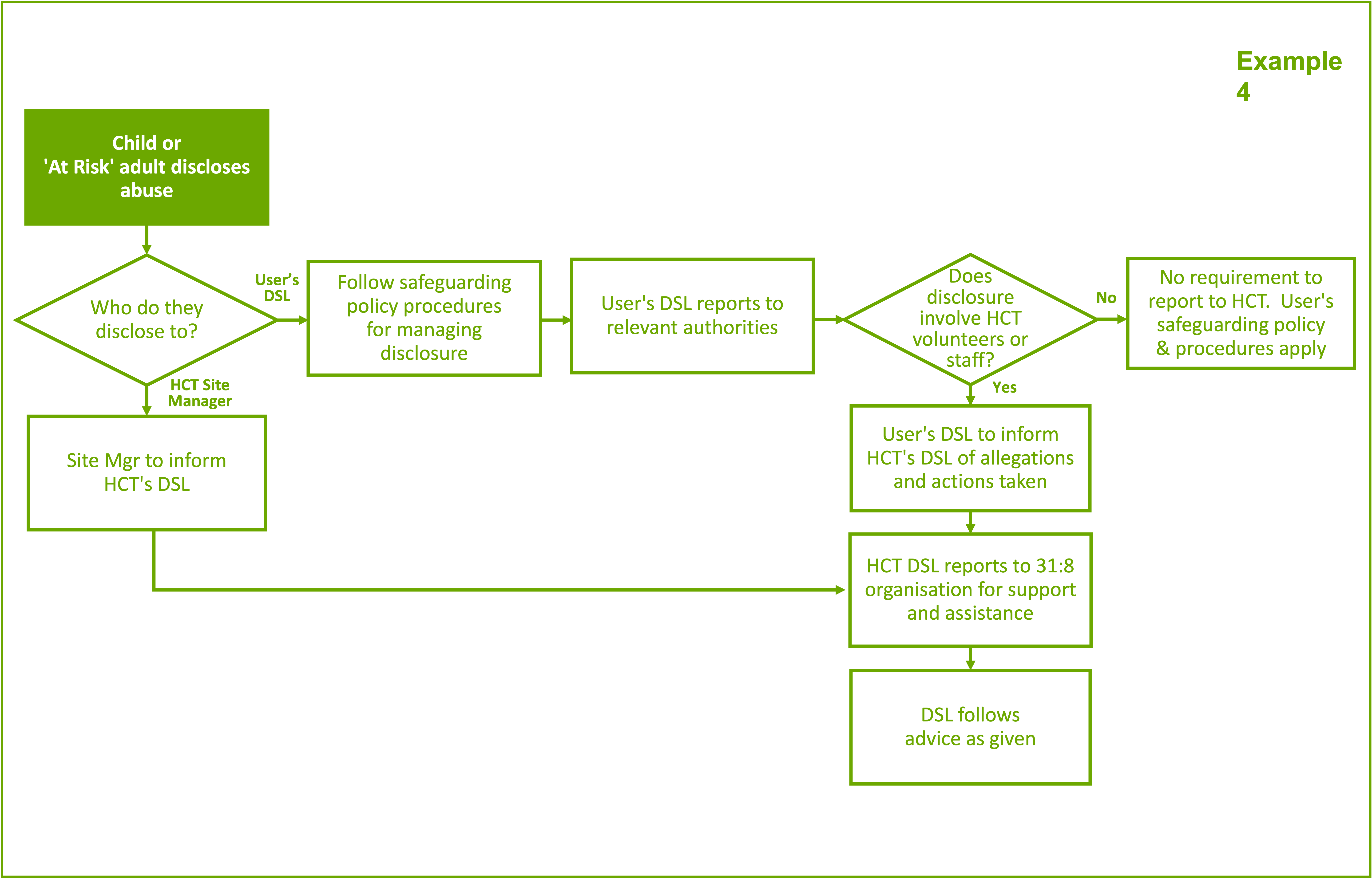

https://www.gov.uk/guidance/how-to-report-a-serious-incident-in-your-charity
